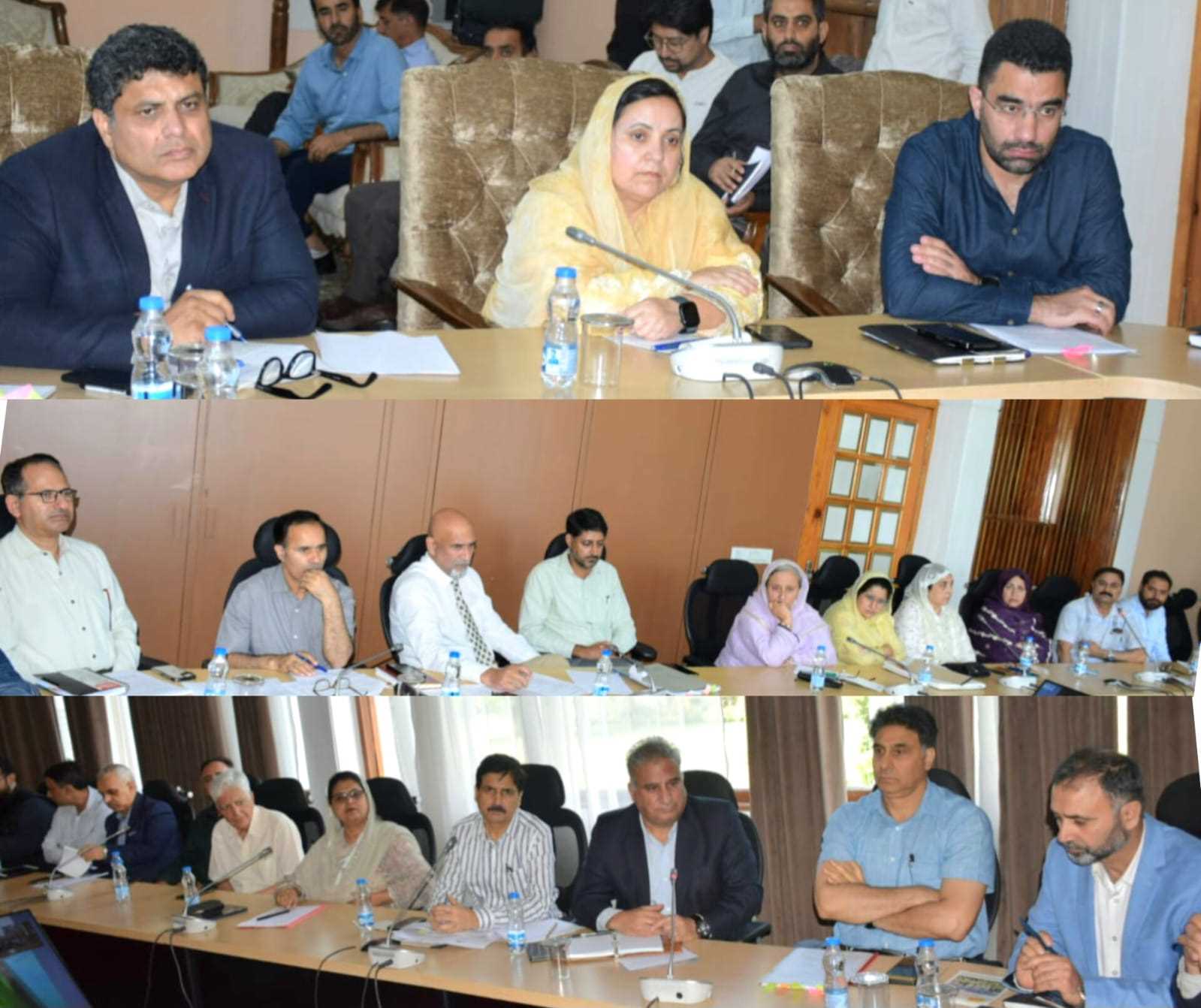
Minister for Health & Medical Education, School Education, Higher Education and Social Welfare, Sakeena Itoo today chaired a first-of-its-kind stakeholders’ meeting on the burning issue of drug de-addiction across Jammu and Kashmir.
The meeting, held at Sher-i-Kashmir Convention Centre (SKICC), was attended by Commissioner Secretary Social Welfare Department, Secretary Health & Medical Education, DIG Police Crime Branch, Director School Education Jammu/Kashmir, Director Health Services Kashmir, Director Colleges, Principals of degree colleges, Chief Education Officers, Zonal Education Officers, school heads, representatives of NGOs, doctors, experts, civil society members and other stakeholders, both in person and through virtual mode.
During the meeting, participants voiced serious concern over the rampant rise of drug abuse among children and youth in J&K. They flagged the easy availability of narcotics and psychotropic substances, particularly around schools, colleges and other vulnerable areas. Suggestions were made to introduce training modules in curricula, establish structural mechanisms, and conduct scientific awareness campaigns. Several substance users undergoing rehabilitation also shared their personal stories, narrating how they got trapped in addiction and the challenges of recovery.
Addressing the meeting, Minister Sakeena stressed on the need for shift from token awareness to meaningful action. “Awareness programmes must go beyond speeches. If we are able to save even one child through such initiatives, it will be a significant contribution to society,” she asserted.
The Minister announced that the installation of CCTV cameras in and around schools and colleges would be made mandatory to monitor activities and prevent illicit drug circulation. She also called for the formation of community-based monitoring committees comprising parents, civil society members, and religious leaders, facilitated by the Education Department.
These committees, she directed, should submit monthly reports to the Directors of School Education and Higher Education on their activities and impact.
The Minister further underlined the importance of regular health and behavioural screenings in colleges and schools for early detection and timely counselling of vulnerable students. “If we collectively implement surveillance, monitoring, community involvement, and screening, I am confident that we can make meaningful progress in addressing the drug menace,” she affirmed.
The Minister assured that the government would extend full support to institutions, civil society and NGOs working in the field of de-addiction, and urged all stakeholders to work in close coordination to protect the future of the youth of Jammu and Kashmir.
Minister for Health & Medical Education, School Education, Higher Education and Social Welfare, Sakeena Itoo today chaired a first-of-its-kind stakeholders’ meeting on the burning issue of drug de-addiction across Jammu and Kashmir.
The meeting, held at Sher-i-Kashmir Convention Centre (SKICC), was attended by Commissioner Secretary Social Welfare Department, Secretary Health & Medical Education, DIG Police Crime Branch, Director School Education Jammu/Kashmir, Director Health Services Kashmir, Director Colleges, Principals of degree colleges, Chief Education Officers, Zonal Education Officers, school heads, representatives of NGOs, doctors, experts, civil society members and other stakeholders, both in person and through virtual mode.
During the meeting, participants voiced serious concern over the rampant rise of drug abuse among children and youth in J&K. They flagged the easy availability of narcotics and psychotropic substances, particularly around schools, colleges and other vulnerable areas. Suggestions were made to introduce training modules in curricula, establish structural mechanisms, and conduct scientific awareness campaigns. Several substance users undergoing rehabilitation also shared their personal stories, narrating how they got trapped in addiction and the challenges of recovery.
Addressing the meeting, Minister Sakeena stressed on the need for shift from token awareness to meaningful action. “Awareness programmes must go beyond speeches. If we are able to save even one child through such initiatives, it will be a significant contribution to society,” she asserted.
The Minister announced that the installation of CCTV cameras in and around schools and colleges would be made mandatory to monitor activities and prevent illicit drug circulation. She also called for the formation of community-based monitoring committees comprising parents, civil society members, and religious leaders, facilitated by the Education Department.
These committees, she directed, should submit monthly reports to the Directors of School Education and Higher Education on their activities and impact.
The Minister further underlined the importance of regular health and behavioural screenings in colleges and schools for early detection and timely counselling of vulnerable students. “If we collectively implement surveillance, monitoring, community involvement, and screening, I am confident that we can make meaningful progress in addressing the drug menace,” she affirmed.
The Minister assured that the government would extend full support to institutions, civil society and NGOs working in the field of de-addiction, and urged all stakeholders to work in close coordination to protect the future of the youth of Jammu and Kashmir.
© Copyright 2023 brighterkashmir.com All Rights Reserved. Quantum Technologies